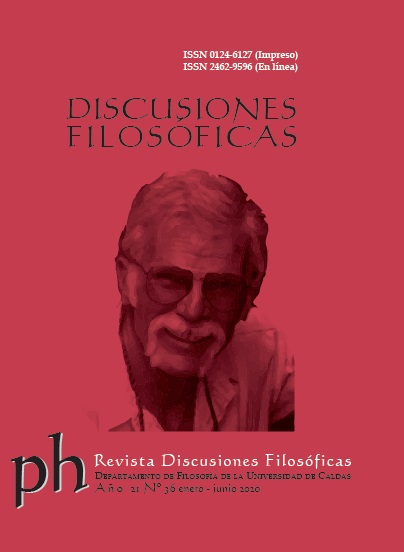Authors
Abstract
This paper proposes that what is necessary a posteriori corresponds to a hybrid case of justification, without this leading to an extreme rationalist commitment. In the cases of necessary a posteriori statements, the logical principles that they instantiate are of a priori nature, and the information
of statements such as "Water is H2 O" or "Pain is the stimulation of the fiber - c" are knowable only a posteriori. In order to explain this hybridity, how the reductio strategy allows accepting a moderate rationalist approach will be discussed. Bootstrapping will be considered as a paradigmatic case of hybrid epistemic justification. The discussion regarding the a priori - a posteriori nexus tends to establish a hierarchy in which one of the epistemic accesses is privileged, which
will be rejected.
Keywords
References
BonJour, Laurence. In Defense of Pure Reason: A Rationalist Account of A Priori Justification. Cambridge: Cambridge University Press, 1998. Print.
Casullo, Albert. A Priori Justification. Oxford: Oxford University Press, 2003. Print.
Chalmers, David. “Two-Dimensional Semantics” En Lepore. E. & Smith, B. (eds) Oxford Handbook of the Philosophy of Language. Oxford University Press, 2006: p. 574 - 606. Print.
Crossley, John Newsome & Humberstone, Lloyd. “The Logic of ‘Actually’”. Reports on Mathematical Logic, 8, 1977: 11-29. Print.
Fischer, Eugen & Collins, John (eds.), Experimental Philosophy, Rationalism, and Naturalism: Rethinking Philosophical Method. Routledge. 2015. Print.
Geirsson, Heimir. “Conceivability and Defeasible Modal Justification”. Philosophical Studies, 122 (3), 2005: 279-304. Print.
Gendler, Tamar & Hawthorne, John (eds.). Conceivability and Possibility. Oxford: Oxford University Press. 2002. Print.
Howell, Robert. "The Two-Dimensionalist Reductio". Pacific Philosophical Quarterly 89 2008: 348-58. Print.
Jackson, Frank. From Metaphysics to Ethics: A Defense of Conceptual Analysis, Oxford University Press. 1998a. Print.
Jackson, Frank & Pettit, Philip. "A Problem for Expressivism', Analysis, 58, 4, 1998b: p. 239-51. Print.
Kaplan, Rachel. The Experience of Nature: A Psychological Perspective. Cambridge University Press. 1989. Print.
Kripke, Saul. Naming and Necessity. Cambridge, MA: Harvard University Press. 1980. Print.
McLeod, Stephen. “Rationalism and Modal Knowledge”. Crítica, 41 (122), 2009: p. 29-42. Print.
Mill, John Stuart. System of Logic, Ratiocinative and Inductive. En Collected Works of John Stuart Mill, Robson, J.M. (ed.), Toronto: University of Toronto Press, 1963. Print.
Miranda, Rafael. “Enunciados de identidad, invariabilidad proposicional y estipulación contextual”. Discusiones Filosóficas, 14 (23), 2013: p. 105-133. Impreso.
______. “Enunciados necesarios a posteriori, necesidad débil y racionalismo”. Ideas y Valores, 65 (160), 2016: p. 49-74. Impreso.
______. “Sobre el abuso de lo necesario a posteriori” TRANS/FORM/AÇÃO, 40, I, 2017: p. 211-234. Impreso.
______. “Rigidez de jure y de facto en los términos generales para clases naturales" Areté Vol. XXIV Nº 1, 2012:pp. 57 – 90. Impreso
Nimtz, Christian. (2007). Two-Dimensional Semantics – the Basics. Christian Nimtz. Web
Putnam, Hilary. “The Meaning of ‘Meaning’”. Mind, Language, and Reality. Cambridge University Press, Cambridge, 1975. Print.
Rescher, Nicholas. “Reductio ad Absurdum”. Internet Encyclopedia of Philosophy (IEP), 2002. Web.
Roca-Royes, Sonia. “Conceivability and De Re Modal Knowledge”. Noûs 45 (1), 2011: p. 22-49. Print.
Schroeter, Laura. "Two-Dimensional Semantics". The Stanford Encyclopedia of Philosophia, Zalta, E. (ed.), 2012. Web
Schwartz, Stephen. “Mill and Kripke on Proper Names and Natural Kind Terms”. British Journal for the History of Philosophy, 21 (5), 2013: p. 925-945. Print.
Soames, Scott. “Kripke on Epistemic and Metaphysical Possibility”.
Saul Kripke, Berger, Alan. (ed.), Cambridge University Press. 2011. Print.
Stalnaker, Robert. "Possible Worlds". Nous 10, 2013: p. 65-75. Print.
Tahko, Tuomas. “On the Modal Content of a Posteriori Necessities”. Theoria, 75, 2009: p. 344-357. Print.
Tahko, Tuomas. “A Priori and A Posteriori: A Bootstrapping Relationship”. Ontology Metaphysics, 12, 2011: 151-164. Print.
Yablo, Stephen. “Concepts and consciousness”. Philosophy and Phenomenological Research, 59 (2), 1999: p. 455-463. Print.

 PDF (Español)
PDF (Español)
 FLIP
FLIP





























